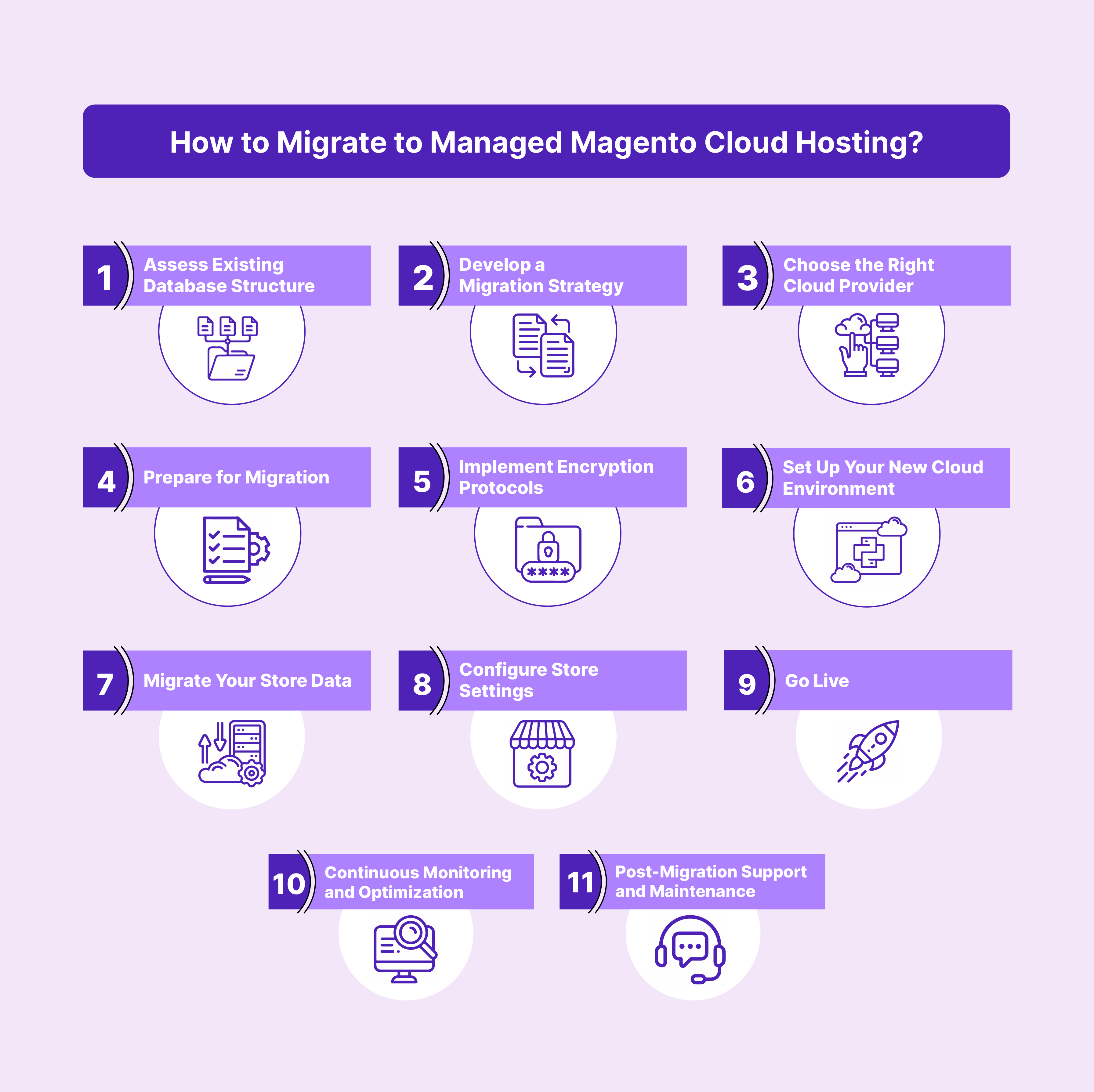
Why Switch to Managed Magento Cloud Hosting?
How do you handle Magento hosting concerns and server-related issues? Managed Magento Cloud Hosting is your solution. It provides specialized hosting for ecommerce stores. It offers automatic scaling, high availability, and tailored security. This guide lists 14 signs indicating the need to switch to Magento cloud hosting.
Key Takeaways
-
Discover how Managed Magento Cloud Hosting combines scalability with specialized services.
-
Explore 14 indicators that signal the need to shift to managed Magento cloud hosting.
-
Learn how to streamline migration.
-
Explore the benefits of tailored support, security features, and enhanced control.
-
Discover the significance of a hands-off approach in managed cloud hosting.
What is Managed Magento Cloud Hosting?
Managed Magento Cloud Hosting operates on virtual servers in a cloud infrastructure. It combines cloud computing’s scalability with managed services.
Businesses benefit from automatic updates, security patches, and performance monitoring. Integration with Magento extensions and plugins ensures smooth functionality and enhanced user experience.
14 Reasons To Switch to Managed Magento Cloud Hosting
1. Performance Enhancement

Are you experiencing sluggish loading times, frequent website downtimes, or sudden traffic spikes? Managed Magento cloud hosting addresses these concerns by offering scalable infrastructure and resources. It ensures your online store operates seamlessly, even during peak periods. With managed cloud hosting, you benefit from timely checks addressing performance bottlenecks.
2. Enhanced Security Measures
Keeping your Magento store secure can prove difficult for self-managed ecommerce stores. Managed Magento cloud hosting offers:
-
Built-in security features
-
Regular updates, and
-
Expert support
It helps safeguard your store against potential vulnerabilities and breaches. It offers firewall protection and regular security audits. It also ensures compliance with industry standards and regulations.
Managed hosting providers offer advanced security solutions such as:
-
Intrusion detection, and
-
Malware scanning against cyber threats
3. Limited Support
Shared or basic hosting plans lack dedicated support tailored to Magento’s requirements.
Managed Magento cloud hosting offers 24/7 assistance from professionals. These experts handle essential tasks such as:
-
Server maintenance
-
Software updates, and
-
Security patches
They have in-depth knowledge of Magento’s architecture, functionalities, and best practices. It enables them to provide tailored solutions and recommendations.
4. Access and Control Restrictions

Shared hosting environments limit server access and software customization. Managed Magento cloud hosting offers greater control and flexibility. It empowers you to customize your hosting environment according to your business needs.
Cloud hosting platforms also provide intuitive control panels and management interfaces.
5. Feature Limitations
Basic hosting plans may lack essential features such as:
-
Automated backups
-
Advanced caching solutions
It results in limited store performance and functionality. Managed Magento cloud hosting offers automated backups and CDN integration. It also offers advanced caching solutions.
By leveraging these advanced features, you can ensure seamless operations.
6. Store Growth and Scalability
As your e-commerce store expands, your hosting requirements will grow accordingly. Cloud hosting offers Magento scalability to increase:
-
Traffic
-
Product catalogs, and
-
Data storage demands
It helps you future-proof your business and cater to customer needs.
7. Server Management

Managing servers, software updates, and security patches can be time-consuming and resource-intensive. It uses valuable resources of core business activities.
Managed Magento cloud hosting handle Magento server management tasks. It allows you to focus on strategic operations and business growth. You can optimize resource allocation by reducing server management responsibilities.
8. Development Bottlenecks
Shared hosting environments often restrict development tools and access. Cloud hosting offers developer-friendly tools and SSH access.
You can collaborate among development teams by leveraging cloud-based environments. It ensures you stay ahead of the competition.
9. Business Continuity & Disaster Recovery
Ecommerce stores go offline due to events such as power outages or natural disasters. Managed Magento cloud hosting prevents this by providing distributed data centers.
By leveraging these disaster recovery measures, you can safeguard your business operations. It also helps maintain uninterrupted service delivery to your customers. It preserves your brand reputation and customer trust.
10. Integration Challenges
Continuously monitor the performance of your migrated database. Optimize resource utilization and configuration settings to enhance efficiency and reliability.
11. Global Expansion

Expanding your Magento store to international markets requires infrastructure and global reach. Cloud hosting offers global infrastructure and content delivery networks (CDNs). It ensures fast loading times and seamless shopping experiences regardless of geographic location.
By leveraging cloud-based solutions, you can:
-
Expand your reach
-
Tap into new markets, and
-
Capitalize on global opportunities
It drives business growth and increases revenue streams.
12. Marketing Agility & Personalization
Delivering personalized marketing campaigns and experiences at scale requires advanced data analytics. It also requires integration with marketing automation tools.
Cloud platforms integrate these features, empowering you to create targeted campaigns. It personalizes customer journeys and boosts your marketing ROI.
It also helps enhance:
-
Marketing agility
-
Drive customer engagement, and
-
Achieve better business outcomes
It helps to drive long-term revenue growth.
13. Sustainable Hosting

Concerns about environmental impact are increasingly important for businesses. Cloud providers invest in renewable energy sources and eco-friendly data centers. These measures reduce carbon footprint.
By choosing cloud hosting, you can contribute to a more sustainable future. It also demonstrates corporate responsibility.
By embracing sustainable hosting solutions, you can:
-
Reduce environmental impact
-
Enhance brand reputation, and
-
Attract environmentally conscious consumers
14. Hands-Off Management
Managed cloud hosting offers a hands-off approach. Providers handle:
-
Server maintenance
-
Software updates
-
Performance optimization
Key Features of Managed Magento Cloud Hosting
| Key Feature | Description |
|---|---|
| Cost-Effective Solutions | Managed Magento Cloud Hosting offers cost-effective solutions for businesses of all sizes. |
| Flexible Pricing Plans | Choose from a variety of flexible pricing plans tailored to your specific needs and budget constraints. |
| Pay-As-You-Go Model | Benefit from a pay-as-you-go model. It allows you to scale resources up or down as needed, optimizing cost efficiency. |
| Transparent Billing Process | Enjoy a transparent billing process with no hidden fees. It ensures clarity and predictability in your hosting expenses. |
| Customizable Service Levels | Customize service levels according to your business requirements. It ensures you only pay for the features and resources you need. |
| 24/7 Customer Support | Access round-the-clock customer support from experienced professionals. They assist you with any inquiries or issues. |
How to Migrate to Managed Magento Cloud Hosting?

1. Assess Existing Database Structure
Evaluate your current database architecture. Identify potential compatibility issues, data dependencies, and schema complexities. It helps in a smooth migration process.
2. Develop a Migration Strategy
Develop a detailed migration strategy outlining the necessary steps. Include:
-
Data backup procedures
-
Schema modifications, and
-
Testing protocols
Ensure the strategy prioritizes data integrity and consistency throughout the migration.
3. Choose the Right Cloud Provider
Managed Magento cloud hosting providers are important for a seamless migration experience.
Research and compare providers based on features, pricing, support options, and migration assistance. Prioritize providers with experience in Magento migrations.
4. Prepare for Migration
Ensure you have a comprehensive backup of your Magento store. It includes files, database, and media. Verify the accessibility of your backups to mitigate any potential data loss risks.
Some providers offer assisted migration services. It helps streamline the migration process for enhanced convenience.
5. Implement Encryption Protocols
Implement encryption protocols and SSL certificates to safeguard sensitive information during migration. It helps ensure the security and confidentiality of your data throughout the transition.
6. Set Up Your New Cloud Environment
Collaborate with your chosen provider to establish your new cloud server environment. Configure it to accommodate Magento. It entails selecting:
- An appropriate plan,
- Configuring databases, and
- Installing necessary software components
7. Migrate Your Store Data
Transfer your store data. It includes files, databases, and media for the new cloud environment. It can be using either manual methods or migration tools. Execute the migration process carefully to ensure data integrity. It minimizes disruptions to your store’s operations during the transition.
8. Configure Store Settings
Update your store’s configuration files to align with the new server environment. Incorporate changes to:
- Database connection details
- URLs, and
- Caching configurations
Conduct thorough testing to validate your store’s functionality and Magento performance. Also, address any potential issues before proceeding.
9. Go Live
Now, it is time to transition your store to the new hosting environment.
It ensures seamless transition and mitigates disruptions to your ecommerce operations.
10. Continuous Monitoring and Optimization
Continuously monitor the performance of your migrated database. Optimize resource utilization and configuration settings to enhance efficiency and reliability.
11. Post-Migration Support and Maintenance
Leverage your hosting provider’s support and maintenance services. It helps address any post-migration issues or concerns. Maintain regular communication and collaboration to ensure ongoing success.
FAQs
1. What factors to consider when selecting a managed Magento cloud hosting package?
When choosing a hosting package, consider factors such as:
-
Your site’s traffic,
-
The amount of disk space required, and
-
The level of customer support provided
Evaluate the hosting resources. It includes RAM and SSD storage.
2. How does the migration process work when transitioning to Magento cloud hosting?
The migration process involves assessing your current database structure. You have to develop a detailed migration strategy. Next, select the right cloud provider. Ensure a comprehensive backup of your Magento store, including files and databases. Lastly, collaborate with your chosen provider.
3. What SSL-related measures should be implemented during the migration process?
To safeguard sensitive information during migration, implement encryption protocols and SSL certificates. It ensures the security and confidentiality of your data throughout the transition.
4. How can store owners optimize their Magento site's performance post-migration?
After migration, continuously monitor database performance and configuration settings. Leverage support and maintenance services from your hosting provider. It helps address any post-migration issues or concerns.
5. What advantages does managed Magento cloud hosting offer for global expansion?
Managed Magento cloud hosting provides global infrastructure and content delivery networks (CDNs). It ensures fast loading times and seamless shopping experiences.
Summary
Managed Magento Cloud Hosting ensures ease of operations and high security for Magento e-commerce. Here's a quick recap of how it helps ecommerce stores:
-
Enhances performance through automatic scaling and bottleneck resolution
-
Improves security with built-in features, regular updates, and expert support
-
Dedicated support tailored to Magento's requirements
-
Greater control and flexibility to customize your hosting environment
-
Advanced features like automated backups, CDNs, and caching solutions
-
Accommodates store growth with scalable resources
-
Simplifies server management and focus on core business activities
-
Uses developer-friendly tools and SSH access for collaboration
-
Ensures business continuity and disaster recovery through distributed data centers
-
Integrates advanced data analytics and marketing automation tools
-
Facilitates global expansion through global infrastructure and CDNs
-
Delivers personalized marketing campaigns and experiences at scale
-
Embraces eco-friendly practices and sustainable hosting solutions
-
Hands-off management with provider-handled maintenance and optimization
Optimize your Magento operations with managed Magento cloud hosting plans.



